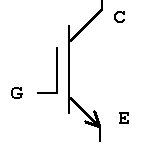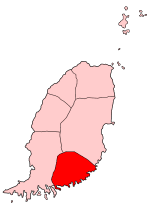
An insulated-gate bipolar transistor (IGBT) is a three-terminal power semiconductor device primarily used as an electronic switch which, as it was developed, came to combine high efficiency and fast switching. It consists of four alternating layers (P-N-P-N) that are controlled by a metal-oxide-semiconductor (MOS) gate structure without regenerative action. Although the structure of the IGBT is topologically the same as a thyristor with a 'MOS' gate, the thyristor action is completely suppressed and only the transistor action is permitted in the entire device operation range. It switches electric power in many applications: variable-frequency drives (VFDs), electric cars, trains, variable speed refrigerators, lamp ballasts, air-conditioners and even stereo systems with switching amplifiers.

The 74th (Yeomanry) Division was a Territorial Force infantry division formed in Palestine in early 1917 from three dismounted yeomanry brigades. It served in the Sinai and Palestine Campaign of the First World War, mostly as part of XX Corps. In May 1918 it was sent to the Western Front where it remained until the end of the war.
The London Regiment was an infantry regiment in the British Army, part of the Territorial Force. The regiment saw distinguished service in World War I and was disbanded in 1938, shortly before World War II, when most of its battalions were converted to other roles or transferred elsewhere. The lineage of some of its former battalions is continued by the current regiment of the same name.

William Henry "Bully" Hayes was a notorious American-born ship's captain who engaged in blackbirding in the 1860s and 1870s.

The 7th Infantry Brigade and Headquarters East is a formation in the British Army with a direct lineage to 7th Armoured Brigade and a history that stretches back to the Napoleonic Wars. It saw active service in the Crimean War, the Second Boer War and both World War I and World War II. In 2014, the 7th Armoured Brigade was re-designated as 7th Infantry Brigade, thereby ensuring that the famed "Desert Rats" continue in the British Army's Order of battle.

The 45th Infantry Division was an infantry division of the Territorial Force, part of the British Army. It was formed in the First World War as a duplicate of the 43rd (Wessex) Division and was originally formed as the 2nd Wessex Division in 1914–1915 before later being renamed as the 45th Division and the brigades numbered. It was sent overseas to India in December 1914 to relieve Regular Army units for service in France. The division remained there for the rest of the war, supplying drafts of replacements to the British units fighting in the Middle East and later complete battalions.
George Lewis Becke was an Australian Pacific trader, short-story writer and novelist.

Robert Bartko is a road bicycle and track cyclist from Germany, who was born in the former East Germany. He won two gold medals at the 2000 Summer Olympics in Sydney, Australia: in the individual and in the team pursuit. He competed in races for professional riders from 2001 to 2014.
Axel Dieter Becke is a physical chemist and Professor of Chemistry at Dalhousie University, Canada. He is a leading researcher in the application of density functional theory (DFT) to molecules.
The 3rd Mounted Division was a Yeomanry Division of the British Army active during World War I. It was formed on 6 March 1915 as the 2/2nd Mounted Division, a replacement/depot formation for the 2nd Mounted Division which was being sent abroad on active service. In March 1916, it was renumbered as the 3rd Mounted Division and in July 1916 as the 1st Mounted Division. In September 1917, the division was reorganized as a cyclist formation and redesignated as The Cyclist Division. It remained in the United Kingdom throughout the war and was disbanded in June 1919.
The 1st Mounted Division was a Yeomanry Division of the British Army active during World War I. It was formed in August 1914 for the home defence of the United Kingdom from four existing mounted brigades of the Territorial Force, each of three regiments of Yeomanry. The divisional order of battle changed often, as the 1st Line brigades left for service overseas and were replaced by 2nd Line formations. It was converted to the 1st Cyclist Division in July 1916, and was broken up in November 1916 without being involved in active service. It remained in East Anglia throughout its existence.

The Guards Division was an infantry division of the British Army that was formed in the Great War in France in 1915 from battalions of the elite Guards regiments from the Regular Army. The division served on the Western Front for the duration of the First World War. The division's insignia was the "All Seeing Eye".
Becke is a surname. Notable people with this surname include:
The 4th Mounted Division was a short-lived Yeomanry Division of the British Army active during World War I. It was formed on 20 March 1916, converted to 2nd Cyclist Division in July 1916 and broken up on 16 November 1916. It remained in England on Home Defence duties throughout its existence.
The 2nd South Midland Mounted Brigade was a yeomanry brigade of the British Army, formed as part of the Territorial Force in 1908.

Daniel Becke, is a former road bicycle and track cyclist from Germany, who was born in the former East Germany. He won a gold medal in the team pursuit at the 2000 Summer Olympics in Sydney. He retired in 2008.
73rd Division was a short-lived infantry division of the British Army during World War I. It served in Home Forces and never went overseas.
The Warwickshire Royal Horse Artillery was a Territorial Force Royal Horse Artillery battery that was formed in Warwickshire in 1908. It was the first Territorial Force artillery unit to go overseas on active service, spending the whole of the First World War on the Western Front, mostly with 1st Cavalry Division and 29th Division. A second line battery, 2/1st Warwickshire RHA, also served on the Western Front in 1917 and 1918 as part of an Army Field Artillery Brigade. Post-war it was reconstituted as a Royal Field Artillery battery.
Southern Army was a home service formation of the British Army during the First World War, responsible for the defence of South-East England, including both sides of the Thames Estuary.









